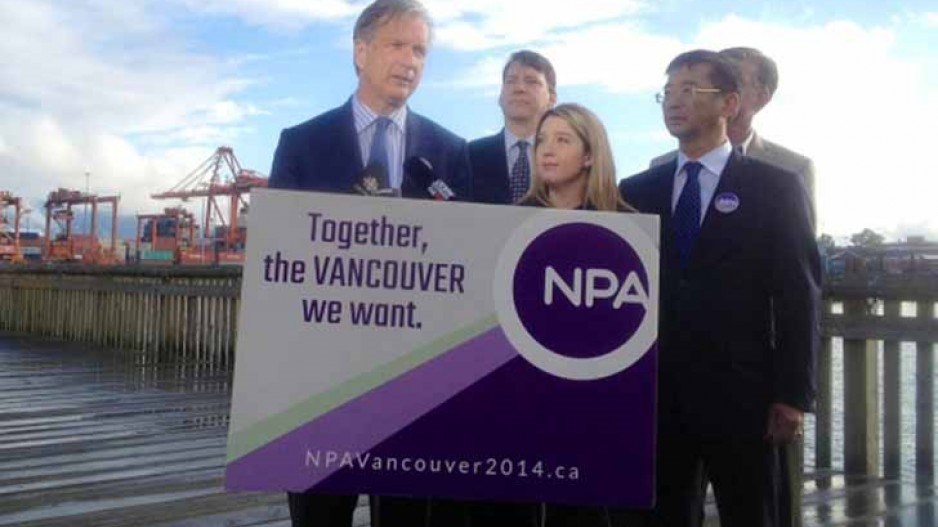Saying Vancouver hasn’t prospered in the past six years under Mayor Gregor Robertson and his ruling party, NPA mayoral candidate Kirk LaPointe unveiled a multi-prong plan Tuesday that aims to boost the city’s economy and increase the supply of family and seniors’ housing.
Standing on a pier at Crab Park, with stacks of shipping containers at the port serving as a backdrop, LaPointe said an NPA government would support all sectors of resource development including lobbying for liquefied natural gas (LNG) regional offices in Vancouver.
LaPointe also reiterated his party’s interest in Kinder Morgan’s proposal to build another pipeline from Alberta to Burnaby but cautioned the NPA’s support would only come if the National Energy Board set conditions that made it “the safest project in the world.”
“If it isn’t safe, we’re going to oppose it,” he said.
LaPointe used statistics and reports to point out Vancouver’s median family income grew only 3.6% between 2008 and 2012 compared to the national average of 8.2%. Vision has been in power since 2008.
Another statistic he referred to was that the average annual salary of a mineworker was $92,000, which is $20,000 more than the average family income in Vancouver. The liquefied natural gas industry is equally lucrative for workers, he added.
“So if [liquefied natural gas] is going to be built in B.C., let’s host the office jobs in Vancouver and not in Calgary or Edmonton,” he said, noting the NPA would work with the provincial government to get regional offices set up in the city.
LaPointe’s belief is that more high-paying jobs in Vancouver translates to more income, making housing more attainable. But he said “that can only be part of the equation” to building more housing.
In what he called the most critical challenge for the city, LaPointe said families and seniors are going without adequate housing. His plan is to revive the 1995-era CityPlan, which established a broad set of directions to guide city programs, policies and actions over 20 years.
LaPointe said the approach of CityPlan put the power into the hands of residents rather than politicians devising a plan and then taking it to neighbourhoods.
“It will be our great conversation on the Vancouver we want,” he said, noting two outcomes would be to “meaningfully increase” the housing supply for seniors and families.
But when questioned by reporters about how many units would be built — as Vision Vancouver supplied last week in announcing its so-called affordability agenda — LaPointe said he didn’t want to preclude input from residents.
“The beauty of [the CityPlan concept] is that it is an open ended process that belongs to people and it’s not dictated by city hall with arbitrary numbers that really don’t get met by city hall at the moment,” he said.
In what has become one of the hot topics of the campaign, LaPointe promised to study the scope and impact of foreign investment on residential real estate and prices. Creating more clarity and consistency around community amenity contributions paid by developers is another priority for the NPA.
Robertson was quick to criticize the NPA’s platform, noting the absence of any policies around social housing or rental housing, or targets. The mayor announced last week that Vision will build 4,000 rental units over the next four years and require new developments have 35% of the building designed for families, which means two bedrooms or more.
“We have a robust plan at Vision and the NPA is, once again, a no-show on housing,” he told reporters after Tuesday’s council meeting.
As for LaPointe reviving CityPlan, Robertson said the city developed four neighbourhood plans for Marpole, the Downtown Eastside, the West End and Grandview-Woodland that have had “literally thousands and thousands of people involved.” Grandview-Woodland, which has yet to finalize a plan, has convened a citizens’ assembly to guide how it wants its community to look.
Robertson rejected LaPointe’s accusation that only certain developers knew “the secret handshake” at city hall in order to get developments approved. He invited LaPointe to attend public hearings and regular meetings to understand how the public process works.
“If he took the time to be here and witness some of that first-hand, I think he’d understand that lots of people get involved, lots of people take advantage of the opportunity to participate in their neighbourhood, community planning and in these development consultations,” the mayor said.
Robertson said LaPointe was “distorting the facts” around the city’s economy, saying there is a building boom downtown and pointed out head offices such as Telus and the regional offices of Microsoft have set up in Vancouver.
He also disagreed with LaPointe’s assertion that he was campaigning against Kinder Morgan’s pipeline proposal to win votes in next month’s election. LaPointe noted there had been more than a 100% increase in oil tanker traffic in Vancouver waters since Robertson was elected.
“The increase that has occurred over the past six years is within their current permit process,” Robertson said. “But with a massive expansion proposed of pipelines and a seven-fold increase [of tankers], we certainly stepped up our opposition.”




